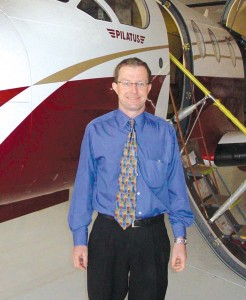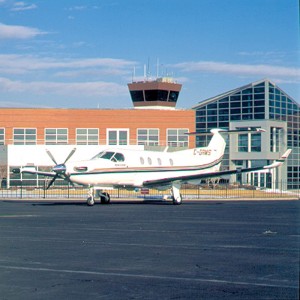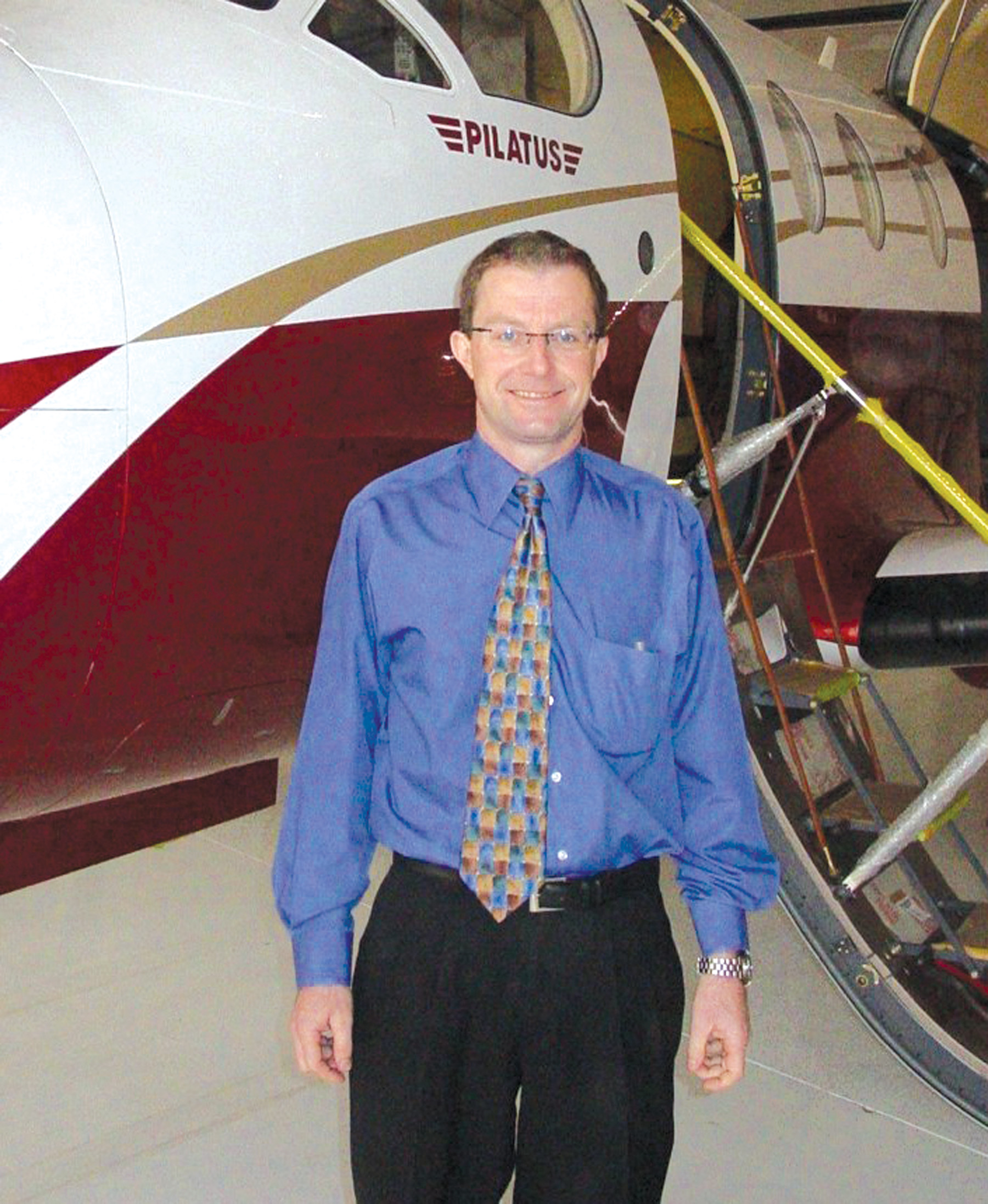By S. Clayton Moore

Swiss-born Pilatus Business Aircraft CEO Thomas Bosshard is a private pilot and has been known to take the company’s demonstrators out for a spin.
Not too many residents of Colorado’s Jefferson County know that their local airport is home to one of the most successful international aviation manufacturers in the country. Pilatus Business Aircraft, a wholly owned subsidiary of Swiss single-engine turboprop manufacturer Pilatus Aircraft, has been based at Jefferson County Airport since 1996.
The company has come a long way in the past decade. Guiding its evolution has been the steady hand of CEO Thomas Bosshard, who has been with the company since 1994. Joining the American arm in 1997 and then rising to the top job in 2002, he has seen Pilatus Business Aircraft through the tough times in 2001 and through a significant upswing in sales over the past three years.
The manufacturer’s sole purpose is to support Pilatus’ PC-12, a versatile single-engine turboprop business jet that has risen in status over the past decade to become the top-selling turbine-powered aircraft in the world.
Bosshard met to talk over the company’s development in a small office on the second floor of the main terminal building that once housed the entirety of Pilatus Business Aircraft. Today, the company has nearly the entire building plus multiple hangars where completion work is done on as many as 20 PC-12 aircraft simultaneously. The privately held company employs more than 70 people who provide finishing touches, marketing, sales and award-winning service for North and South America.
Bosshard, a Swiss citizen, started his career with bachelor’s degrees in mechanical engineering and business administration from the Technical College of Rapperswil, Switzerland. He specialized in composite materials, which brought him quickly into the airline industry. He started out working in heavy maintenance for Swiss Airlines in Zurich before moving on to help set up a maintenance facility in Ireland for Shannon Aerospace. Bosshard joined Pilatus’ European organization in 1994, the same year the company introduced the PC-12 multipurpose aircraft.
“Around 1995, we realized we had to have a more dominant position in the U.S. market,” Bosshard recalled. “Coming in as a foreign manufacturer in this country, you have to overcome a lot of assumptions and judgments that people have made previously about product support and foreign manufacturers. We have an extra threshold to overcome.”
Bosshard was largely responsible for setting up the completion center for the PC-12 at Jefferson County Airport. The aircraft are manufactured in Stans, Switzerland and then delivered to the American facility. About 35 of the company’s 70 employees outfit the base product with seats, trim, lighting, paint, interiors and custom avionics.
The aircraft’s versatility has been a major factor in its success. The pressurized single-engine turboprop, which retails for around $3.3 million, has a maximum altitude of about 30,000 feet and a range of 2,400 nautical miles. That quality of performance lets Pilatus close ranks with competitors like the Caravan 208 and the King Air 200, making the PC-12 an attractive option for business owners who want the range of a business aircraft without the costs of a jet.
“It was designed as a utility aircraft, which is why we ended up with these huge cargo doors as standard equipment. However, as we went forward, the market took a different twist and a lot of single-engine, high-performance piston customers stepped up to the PC-12,” Bosshard explained.
In fact, the airplane is available in several different configurations, which opens up the market for it significantly. The Colorado facility is able to outfit the PC-12 for executive-level transportation with rich interiors, seating for up to nine passengers and amenities like satellite radio. However, the completion team can also equip the aircraft for long-distance cargo delivery, government surveillance and air ambulance services. Some of the more unusual customers include the Royal Flying Doctors Service of Australia, the Red Cross, several commuter airlines and the U.S. Department of Homeland Security. While most of the plane’s owner-operators are entrepreneurs or small businesses, celebrity operators include Harrison Ford and Bill Cosby.
While over 60 percent of the PC-12s produced are owner-flown, Pilatus Business Aircraft does operate a custom sales program for business owners seeking to drop out of the commercial aviation game.
“We see a lot of customers become concept customers and we have our strategy for these kinds of buyers. We offer a service where they buy their plane and our dealers crew the aircraft and maintain it. It’s a turnkey operation and that has been quite a successful program for us,” Bosshard said.
Bosshard says the PC-12’s economy and reliability are huge factors in its popularity.
“First of all, the PC-12 is very easy to fly,” he said. “Actually, the workload in a PC-12 is lower than what you see in a typical high-performance piston single-engine aircraft. It’s very stable and everybody loves the comfort, of course. It’s great for pilots who want to go fast, get above the weather and have some better performance.”
Fuel economy is also fundamental in the buying decision, according to Bosshard. The PC-12 is driven by a Pratt & Whitney PT6A-67B engine capable of 1,200 hp and a cruising speed of 310 mph. Depending on each plane’s configuration, customers get 330 cubic feet of pressurized cabin space, high speed performance, ease of use and even a lavatory for around $365 per hour in operating costs.
The upswing in retail sales has been a pleasant surprise for the Swiss manufacturer, which has traditionally been driven by military sales. The company was formed in 1939 just as World War II was erupting in Europe. With defense in mind, the Pilatus aircraft factory in the Swiss Alps was built near Lucerne, the further point away from any of the country’s borders. There were even secret hangars built inside of Mount Pilatus, from which the company gets its name.
The company has an excellent reputation for building military trainers including the early PC-3 trainer, the PC-6 Porter, the PC-9 turbo trainer and the new PC-21. Its reputation is changing in the U.S. largely due to the popularity of the PC-12 with the business aviation market. The parent company now has three major business units comprised of government products, the maintenance side and the general aviation arm, totaling over 1,000 employees.
“I would say the business climate is easier in the U.S. than it is in Switzerland,” Bosshard said. “It’s certainly easier to sell these aircraft here. North America is traditionally the biggest market for business aircraft anyway and this hemisphere accounts for about 80 percent of our PC-12 sales. Flying is much easier in the United States. You have fewer restrictions in flight plans and controlled areas. We are, however, starting to see more sales in Asia and the Middle East, which is a good sign.”
In fact, according to the latest statistics from the General Aviation Manufacturers Association, the Pilatus PC-12 accounts for 22.4 percent of sales in its field, making it the top-selling turbine powered aircraft. That doesn’t mean that business has always been easy. Like many major manufacturers, Pilatus suffered some setbacks in the wake of 9/11. By May 2003, only two PC-12s were leaving the Colorado facility per month. However, a sudden surge in orders towards the end of that year boosted production to the point where Pilatus Business Aircraft was completing two PC-12s per week. Nearly half the company’s staff skipped vacations that summer in order to deliver all the planes that were ordered.
“We cranked it up quite a bit,” Bosshard recalled. “I would love to take credit for the turnaround but there are a lot of factors involved. Definitely, the economy has turned around. Generally, we do have a slow start in January and then ramp up towards the end of the year. We are small enough and flexible enough to respond to market demand. If we should see there is a reduction in demand, we could throttle back production as well.”
There is no danger of a slowdown anytime soon. The current production schedule is sold out through the end of 2005 and sales are already creeping into 2006. In addition, the company recently celebrated two major milestones. The 500th PC-12 was delivered on January 14 to Scott and Carol Archer of Scottsdale, Ariz. In February, Pilatus celebrated again as the PC-12 fleet logged its one-millionth flight hour in operation. In the near future, the company plans to open a sales operation for South America based in Brazil that will join a dealer network that stretches across the U.S., Mexico and Canada.

Although the company was first established in Vero Beach, Calif., Pilatus Business Aircraft has been headquartered at Jefferson County Airport since 1996.
Part of its success is due to the company’s strong commitment to serving the owner-pilots, corporations, regional airlines, air ambulance operators, government agencies, fractional operators and charter companies around the world who operate the PC-12. In the most recent annual survey of Corporate Aircraft Product Support conducted by Professional Pilot magazine, these operators voted the company #1 in after-sales support for the third straight year. Bosshard credits Piotr Wolak, vice president of customer service, and his team for the accolades.
“It’s the key to our success,” he said. “Our main job here is to distribute the PC-12 through our sales and service network. We have top people in support, warranty handling and other areas as well as over $50 million in our parts inventory to support this fleet. That said, becoming number one is easier than staying number one, but at this point, we’re ahead of the game.”
The aircraft manufacturer has also been a boon to Jefferson County, according to county officials. Bosshard is hosting an event on May 10 in celebration of the 50th anniversary celebration of the Jefferson Economic Council.
Pilatus is one of the stars of the airport,” said Preston Gibson, president of the Jefferson Economic Council. “They are truly one of those companies that create the high-paying jobs that are so important to our economic development. We’re very appreciative of Pilatus’ presence in the county.”
The airport provides a very welcoming home to the company’s manufacturing facility and to its many employees.
“It beats Wichita,” Bosshard laughed. “All of us love it here. Jefferson County helped a lot in facilitating the deal for us to rent more and more of the terminal building. Both the county and airport management have been great hosts and they’ve been great to work with as we have expanded.”
There are still challenges not only in America’s complex aviation market but also for Pilatus as a worldwide organization. Bosshard sees two factors whose uncertainty could impact operations, the most important being the ever-important crisis in fuel prices.
“It’s not meant to be easy but we’re definitely going to face challenges from the economy and where it’s going,” he said. “We ask ourselves constantly about fuel prices. We have a little advantage there because we do manufacture a single-engine aircraft and our customers are not getting hit as hard. That said, fuel prices are a real problem and we are concerned about their overall effect on the economy.”
The second issue that has been debated in nearly every economic forum across the globe is the effect of a weak U.S. dollar on the trade gap.
“The weak dollar is definitely a challenge for us,” he said. “A lot of our components are invoiced in U.S. dollars. Anything manufactured in Europe is still tied to the dollar, whether you’re working with the euro, the Swiss franc or the British pound. We don’t know where the dollar is going to be in a year; if we did, we’d probably do something different. We hope that in some time it will level out for the sake not only of our business but also for the U.S. economy overall.”
Despite these uncertainties, the leadership of Pilatus Business Aircraft is extremely proud of its success, its increasing momentum and its customer satisfaction. Bosshard says that when the program was envisioned, no one believed the PC-12 would survive to grow into today’s sizeable fleet.
“We had a lot of critics at the beginning,” Bosshard remembered. “These so-called industry experts were saying that a one-engine, pressurized aircraft of this size was never going to sell. Having 500 airplanes out there 10 years later tells a different story. I can’t emphasize enough how much airplane our customers get for the money.”
For more information on Pilatus Business Aircraft, call 303-454-9099 or visit [http://www.pilatus-aircraft.com].











